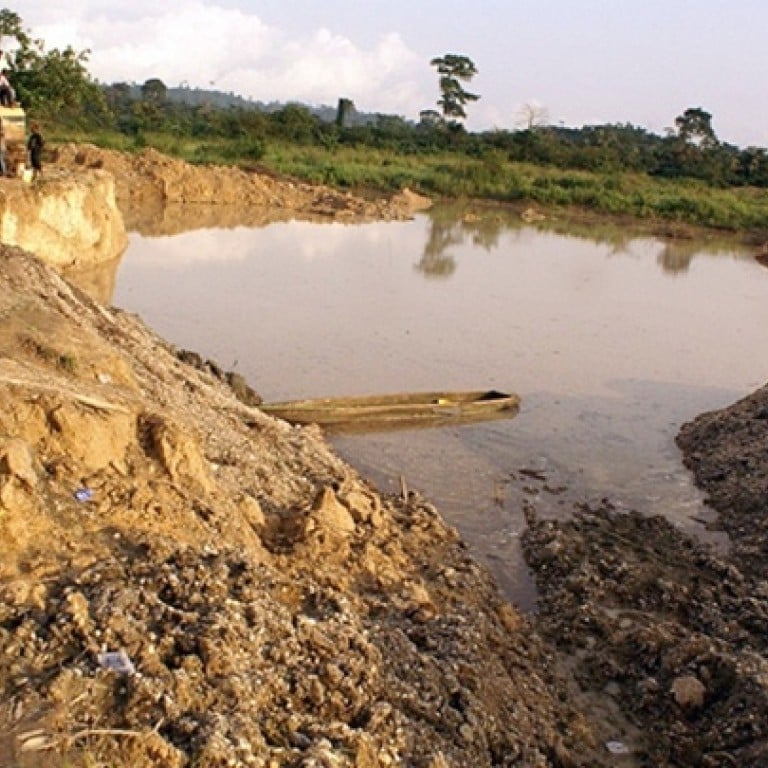
Easy riches draw illegal Chinese miners to Ghana
A task force of police, immigration and national security agents last month began a campaign to flush out illegal miners in Ghana.
Porous borders, corruption and the chance of riches have helped draw illegal gold miners to Ghana from as far away as China, prompting a crackdown that has so far netted over 150 Chinese, experts say.
The continent’s second-largest producer of gold and a beacon of stability in turbulent west Africa, Ghana has been struggling with the impact of small-scale mining, which is illegal for foreigners and damages the environment.
Sydney Casely-Hayford, a prominent financial analyst, said Ghanaian traditional leaders and businessmen encourage the mining, and the crackdown won’t stop it for good.
“It’s quick and easy money,” Casely-Hayford said. “There is nothing you can do because the traditional authorities want the money, the operators want the money, the Chinese want the money -- they want the gold.”
A task force of police, immigration and national security agents last month began a campaign to flush out the illegal miners, which authorities blame for harming water supplies and the environment.
President John Dramani Mahama, who is under increasing pressure to halt the practice, ordered the task force last month.
Last week, it arrested 168 foreigners, mostly Chinese as well as six Russians, said Francis Palmdeti, a spokesman for Ghana’s immigration service.
China was also helping, he said, by aiding repatriations of Chinese involved in illegal mining.
Chinese began making their way to Ghana in recent years, aided by significant trade between the two countries as well as Beijing’s increased investment in Africa as it seeks markets and access to oil as well as other natural resources.
Ghana has a nascent oil industry and China has expressed interest in investing. In 2011, Ghana announced plans to borrow US$800 million (HK$6.2 billion) from China to build natural gas infrastructure.
That same year, Ghana’s government cited Chinese data saying more than 500 Chinese businesses were operating in Ghana, including those involved in electricity projects, water supply and road construction.
Involvement in illicit gold mining developed quickly from there.
“It only just needs or one two people to start it off and it takes off. This is purely a word of mouth,” Casely-Hayford said.
Yu Jie, a senior official for the Chinese embassy in Accra, said the embassy doesn’t know how many Chinese are involved in the industry because it has no system for keeping track of its citizens in the country.
“You know that every Chinese has the freedom to get a passport to go abroad,” he said.
But Chinese citizens were leaving the gold mining areas, he said.
Other nations on the African continent are also involved. Over the weekend, authorities arrested 57 people from west African countries for engaging in “galamsey”, the local term for illegal gold mining.
Those arrested included 51 Niger nationals, two Togolese, one Nigerian and three Ghanaians.
While many Chinese illegal miners entered Ghana on visitors permits, a regional treaty allows for citizens of west African countries to travel freely in the region, and so many come into Ghana under the radar, Palmdeti said.
Palmdeti said the arrests will continue until authorities are satisfied the illegal mining is halted, and will likely expand into the country’s northern region.
“We’ll keep at it until such time that we think some sanity has been restored in that sector of the economy,” Palmdeti said.
But Vladimir Antwi-Danso, director of the Legon Centre for International Affairs and Diplomacy, said the real issue, was the corruption among local officials that allowed the illegal mining to proliferate in the country’s interior.
“This is to satisfy the political heat” hitting the sector right now, Antwi-Danso said. “We have rules and regulations in this country. Why do you need a task force?”
